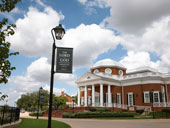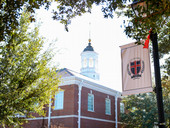Helping Students from a Standpoint of Truth

On first glance, it's a nondescript office suite tucked in the back of the Vance Memorial Library. But the Counseling Center at DBU actually represents a sliver of progress in the pervasive national issue of college students' mental health, which Dr. Jordan Davis has seen first-hand breaking through in both academic circles and Christian circles.
"It's about creating a safe environment," Davis said. "We can throw around the word 'safety' till it sounds like a clinical buzzword. But it really is about people having a safe space to come in and feel whatever they need to feel, process what they're struggling with, and talk to a counselor knowing they're not going to be turned away or judged. It's free, it's confidential, and we genuinely care about every student as a human being and brother or sister in Christ. That's how we serve our students."
Dr. Davis grew up in Midlothian, the youngest of four, and a pastor's son. Faith and church were central factors of the Davis household, and Jordan thought he would follow his father's path and become a pastor. He attended DBU where his mother Joan worked in the psychology and counseling department.
His second year of undergrad, however, he began struggling with severe anxiety.
"I didn't know what anxiety was, and counseling hadn't been on my radar at all," Davis said. "Once anxiety become a real struggle for me, finally going to counseling removed a lot of stigma -- it helped me confront some of my preconceived notions about counseling and psychology in general."
After experiencing that support from counselors and teachers as a student, Davis realized he wanted to pay that forward himself. His trajectory shifted from following his father's profession to more closely following his mother's. A year after earning his doctorate, Davis received a call from Jay Harley offering him an opportunity to serve the students of DBU through supervising the counseling center. With the job came empowerment to kindle discussion and awareness of mental health issues across campus.
"One of the first things I did when I started was meeting with as many athletic coaches as I could to let them all know we're here," Davis said. "Same with fraternity and sorority presidents. From speaking in chapel to faculty workshops, I'm encouraged by the support of having a platform."
The American Council on Education conducted a survey last year of over 400 university presidents (from both private and public universities) and their assessments of college student mental health, as reported by Higher Ed Today. About 80% of the surveyed institutions said that student mental health had become more of a priority than it had been three years ago. While 83% of the universities said that student well-being was part of their strategic plans, only 43% said that student mental health was specifically mentioned in their strategic plans.
Davis noted that in terms of stepping up the conversation paired with taking affirmative action over mental health, the church at large is -- for the most part -- right there with the academic world in need to catch up and step up.
"I don't think it's a secret at all that the church in general has not always done a real good job of addressing mental health issues," Davis said. "It still gets preached too much that if you're struggling with depression or anxiety, then it's a sin problem. I really disagree; some of the most godly people I know deal with anxiety and depression. That doesn't mean they don't trust or love God. But it's encouraging to see a lot of movement happening in the church now. The church as a whole is getting better, and our campus is very supportive in raising awareness and equipping us to respond to student needs."
Davis and his team of counselors practice a model of leadership that is not about "prescribing A, B and C" to "fix people." It's more about adopting a toolbox perspective, equipping students with healthy ways to live from a standpoint of truth.
"We're here to meet their needs -- not just the needs we perceive, but whatever needs they bring in," Davis said. "I think it's similar to Christ's example to meet the physical need first and then address the spiritual need. That's what I hope we're modeling by being welcoming and safe, meeting students where they are but not leaving them there."
The DBU Counseling Center offers free counseling to DBU students, faculty, and staff. The center is located on the first floor of the Collins Learning Center. To get more information about specific counseling services or to make an appointment, please call 214-333-5288.
Jordan Jarrett is a member of University Communications at Dallas Baptist University.








